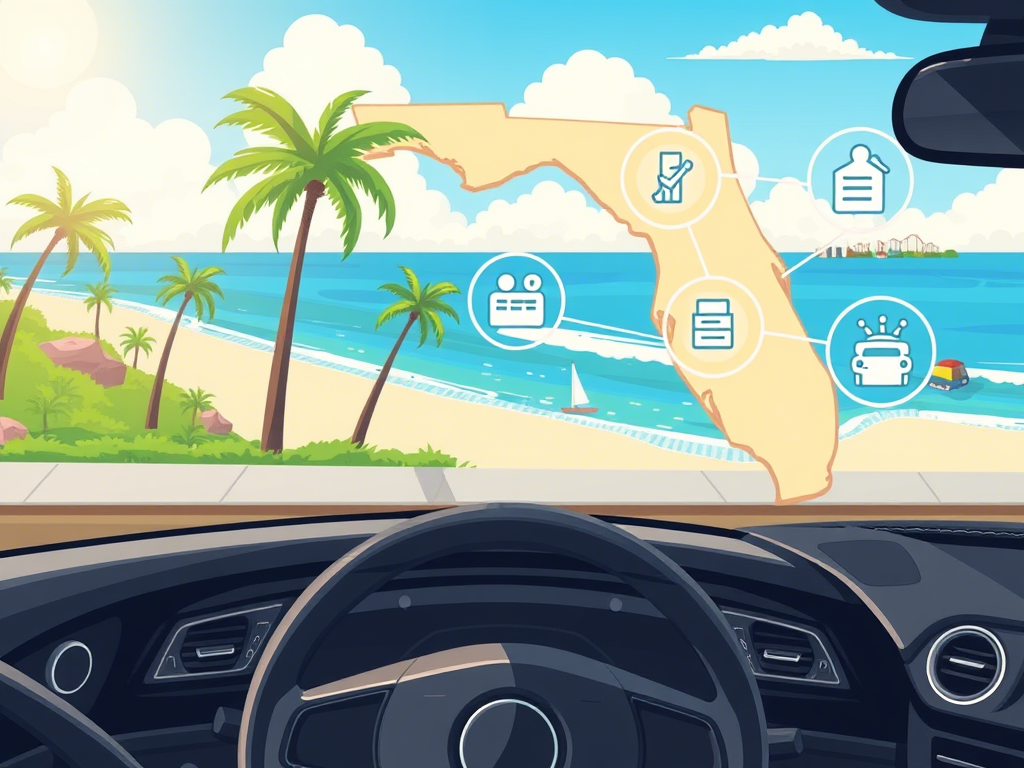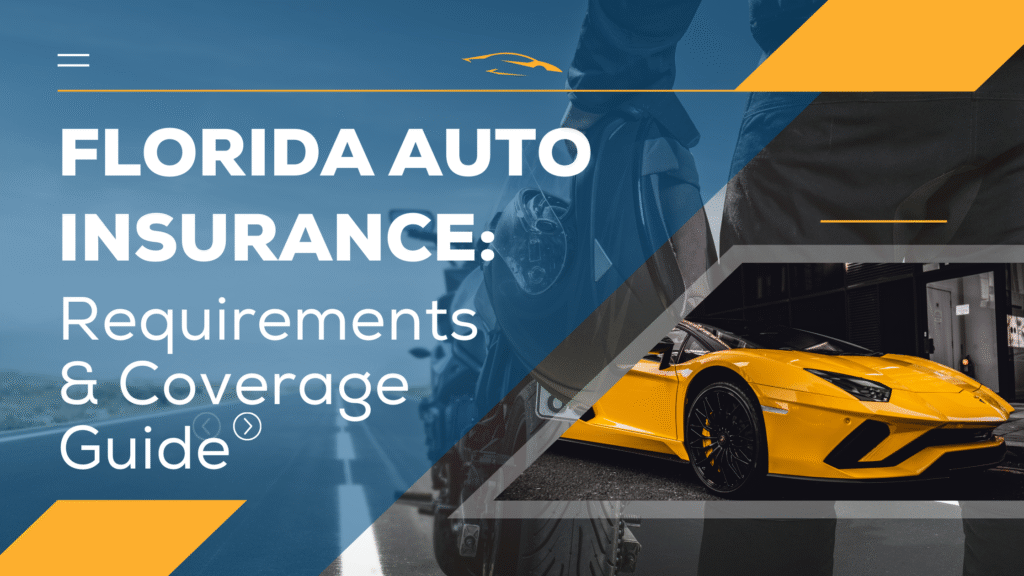If you’re a driver in the Sunshine State, it’s essential to understand Florida’s auto insurance laws before hitting the road. Whether you’re new to the state or just shopping around for better coverage, having the right information can save you money and stress if an accident happens.
In this helpful guide, we’ll break down what Florida requires, the different types of coverage available, and tips to help you make smart choices when choosing your auto insurance plan. So, buckle up and let’s get started!
FAQ’s Florida Auto Insurance
Here are some questions and their short answers that we found are frequently asked by our readers.
Disclaimer: We are not a financial adviser; please consult one.
High rates stem from a 20% uninsured driver rate, frequent hurricanes, costly repairs, and past litigation issues. Full coverage averages $4,125/year, 58% above the national average.
Some insurers like Geico (-10.5%), Progressive (-8.1%), and State Farm (-6%) have filed rate reductions, but overall rates are projected to rise 10% in 2025.
Florida requires $10,000 personal injury protection (PIP) and $10,000 property damage liability. No bodily injury liability is mandated unless you cause serious injury.
Shop around, bundle policies, raise deductibles, maintain a clean driving record, and use discounts like safe driver or telematics programs to lower premiums.
A DUI raises rates by about 30%, adding roughly $1,200/year. Speeding tickets increase premiums by around 20%, depending on the insurer.
Why Auto Insurance Matters in Florida
Florida is the third most populous state in the U.S., and with so many drivers on the road, accidents are unfortunately very common. That’s where insurance comes in. It’s not just required by law, it also helps protect you financially in the event of a crash.
Think about it: the average cost of a car accident can quickly climb into the thousands, especially if injuries are involved. Without proper insurance, you’d be stuck paying those costs out of pocket. Ouch.
Florida’s Minimum Auto Insurance Requirements

Florida is a “no-fault” state, meaning that your own insurance pays for your medical bills after a car accident, regardless of who was at fault. To comply with state law, all drivers must carry a minimum level of coverage:
- Personal Injury Protection (PIP): $10,000 – This helps cover your own medical expenses if you’re injured in an accident, no matter who’s to blame.
- Property Damage Liability (PDL): $10,000 – This pays for damage you cause to someone else’s property with your vehicle.
That’s it for the legal minimum. But before you breathe a sigh of relief and stop reading, don’t. These limits are pretty basic, and in many cases, they may not fully protect you if something major happens.
Optional Auto Insurance Coverage in Florida
While the bare minimum may be enough to legally drive, many Florida drivers choose to add extra coverage for peace of mind. Some common optional types of coverage include:
- Bodily Injury Liability (BIL) – This can help pay for the other person’s medical bills if you are found legally responsible for causing an accident. Though it’s not required by law for most drivers, some situations (like a DUI) will mandate it.
- Collision Coverage – This helps pay to repair or replace your car if it’s damaged in a collision, no matter who’s at fault.
- Comprehensive Coverage – Covers damage to your vehicle from non-collision events, such as natural disasters, theft, fire, or even hitting a deer.
- Uninsured/Underinsured Motorist Coverage – This protects you if you’re in an accident caused by a driver who has no insurance or not enough of it.
- Medical Payments (MedPay) – Another layer of protection for your medical expenses, which can supplement your PIP coverage.
Adding some or all of these coverages can give you financial security and peace of mind. If you’re leasing or financing your car, keep in mind that your lender may require comprehensive and collision insurance as part of the loan agreement.
How PIP Works in Florida
Let’s take a closer look at the Personal Injury Protection (PIP) coverage, since it’s a key part of Florida’s no-fault system.
PIP typically covers:
- 80% of medical expenses, up to $10,000, for you and your passengers
- 60% of lost wages if you can’t work due to accident-related injuries
- Death benefits of up to $5,000
But here’s the catch: you must get medical attention within 14 days of your accident to qualify for full benefits. If your injuries aren’t considered an “emergency medical condition,” your coverage may be capped at just $2,500.
Penalties for Driving Without Insurance in Florida

Thinking of skipping insurance? Don’t do it. Florida has strict penalties for uninsured drivers, including:
- Suspension of your driver’s license and vehicle registration
- Reinstatement fees up to $500
- Possibly requiring you to carry SR-22 insurance (a certificate of financial responsibility)
Driving without insurance isn’t just illegal, it’s risky. One accident could leave you paying thousands out of pocket and possibly facing legal trouble.
Tips for Choosing the Best Car Insurance in Florida
Picking the right auto insurance can feel overwhelming. So, how do you find a plan that works for you and your budget?
1. Compare Quotes
Don’t just settle for the first option. Get quotes from multiple insurance providers to compare rates and coverage options. A few hours of research can save you hundreds of dollars a year.
2. Choose the Right Deductible
Your deductible is the amount you’ll pay out of pocket before your insurance kicks in. A higher deductible usually means a lower premium, but make sure it’s an amount you can afford in case of an accident.
3. Look for Discounts
Many insurers offer discounts for:
- Safe driving records
- Bundling auto and home insurance
- Paying your premium in full
- Good student grades
- Taking a defensive driving course
It can’t hurt to ask your provider about available discounts, you might find extra savings you didn’t know were possible.
4. Consider Your Coverage Needs
Do you drive a new car or something older? Are you commuting to work every day or rarely on the road? Your lifestyle should help guide what kind of coverage you need. A brand-new car might need comprehensive coverage, while an older one might not.
Florida Insurance Laws and Special Considerations
Florida has some unique insurance rules you should know about:
- No-fault only applies to injuries, not property damage: Even though your own insurance pays for your medical care, you can still be sued for vehicle or property damage you cause during an accident.
- Snowbirds, take note: Even if you only live in Florida part-time, if your vehicle is registered in the state, you must carry Florida-compliant insurance.
Also, Florida has a high percentage of uninsured drivers, estimated at over 20%. That means there’s a good chance the person who hits you might not have coverage. That’s why adding Uninsured Motorist coverage can be a very smart move.
The Bottom Line

Auto insurance might not be the most exciting topic, but it plays a big role in staying safe and legal on Florida roads. While the state minimum coverage is a starting point, it probably isn’t enough to fully protect you in a serious accident. By taking the time to understand your options and shop around, you can find coverage that fits your needs without breaking the bank.
Think of insurance like a safety net. You hope you never have to use it, but if you do, you’ll be glad you have the right kind in place.
So whether you’re a lifelong Floridian, a recent transplant, or just planning a road trip through the state, now’s the perfect time to review your auto insurance and make sure you’re covered for whatever the road may bring.
Need Help? Let a Professional Guide You
If you’re still unsure about what coverage is right for you, or you want help comparing quotes, consider speaking with an insurance agent. They can walk you through the options, help customize a plan to fit your needs, and make sure you aren’t paying more than you have to.
Remember, being well-insured isn’t just about following the rules. It’s about protecting yourself, your family, and your financial future.
Final Thoughts
Florida auto insurance laws aren’t always straightforward, but with the right knowledge and smart planning, you can take the wheel with confidence. Stay safe, drive wisely, and make sure your insurance is ready to back you up when it matters most.
Looking for More Insurance Insights?
Want to learn more about car insurance basics? Check out our other helpful guides on:
- Missouri Auto Insurance: Requirements & Coverage Options
- Connecticut Auto Insurance Guide for Drivers: Coverage and Requirements
- Connecticut Auto Insurance Guide: Coverage, Requirements, and Savings Tips
- Tennessee Auto Insurance Requirements and Coverage Guide for 2025
- GEICO vs Progressive: Comparing Rates, Coverage, and Customer Experience
- Kentucky Car Insurance Rates and Tips to Save Money
- Everything You Need to Know About Car Insurance Explained
- Cheapest Car Insurance Options in Oklahoma for 2025
- 2025 Kentucky Car Insurance Rates: Requirements & Costs Explained
- Austin Car Insurance Rates in 2025: What Drivers Should Know
Still have questions? Drop them in the comments or contact a local Florida insurance provider for personalized help.

